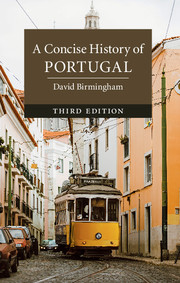Book contents
- Frontmatter
- Dedication
- Contents
- List of illustrations
- Preface to the third edition
- Map1
- Introduction
- Map2
- 1 Peoples, cultures and colonies
- 2 Rebellion and independence in the seventeenth century
- 3 The golden age and the earthquake in the eighteenth century
- 4 Brazilian independence and the Portuguese Revolution
- 5 The bourgeois monarchy and the republicans
- 6 The dictatorship and the African empire
- 7 Democracy and the European Community
- Afterword: entering the twenty-first century
- The houses of Avis, Beja and Habsburg
- The houses of Braganza and Braganza-Saxe-Coburg
- Republican presidents
- Select source materials
- Selected works published since 1990
- Further reading in English
- Index
5 - The bourgeois monarchy and the republicans
Published online by Cambridge University Press: 28 March 2018
- Frontmatter
- Dedication
- Contents
- List of illustrations
- Preface to the third edition
- Map1
- Introduction
- Map2
- 1 Peoples, cultures and colonies
- 2 Rebellion and independence in the seventeenth century
- 3 The golden age and the earthquake in the eighteenth century
- 4 Brazilian independence and the Portuguese Revolution
- 5 The bourgeois monarchy and the republicans
- 6 The dictatorship and the African empire
- 7 Democracy and the European Community
- Afterword: entering the twenty-first century
- The houses of Avis, Beja and Habsburg
- The houses of Braganza and Braganza-Saxe-Coburg
- Republican presidents
- Select source materials
- Selected works published since 1990
- Further reading in English
- Index
Summary
The democratic era of regeneration that began in Portugal in 1851 created a two-party system of government which sought to modernise the country in line with the economic development being undertaken in many other small European kingdoms of the ‘Victorian’ age. The process was interrupted at several turning points. In 1870 an economic recession descended on Europe which undermined the basis of such prosperity as Portugal had achieved by reducing the price of wine and restricting the opportunities to export it. This very temporary recession mildly stimulated the manufacture of import substitutes and once again launched the debate on industrialisation policy. It also encouraged politicians to think again about colonial opportunities. A grandiose plan emerged for a new empire in Africa linking the old slaving ports of the east and west coasts with a ‘rose-coloured map’ spanning the continent. This imperial ambition was eroded first by Belgium and then by an ultimatum from Britain ordering Portugal to withdraw from the Zambezi heartland. Portugal had to settle reluctantly for more modest claims in Angola and Mozambique. The colonial question brought about a crisis of confidence in the crown which led to republican riots. Republicanism gained ground in the 1890s when the rising urban proletariat suffered from genuine deprivation during a prolonged economic recession. At the same time political awareness was increasing in the armed forces and junior officers organised themselves in secret cells of ‘carbonari’ to rival the cells of freemasons among senior officers. In 1908 republican extremism led to the assassination of King Carlos followed two years later by the expulsion of his young son and the declaration of a Portuguese republic. The intelligentsia took over political command of the nation but new initiatives were soon undermined by the outbreak of the First World War. In 1917 Britain pressurised its ‘oldest ally’ to declare war on Germany and Portugal was rapidly bankrupted and demoralised. It briefly but abortively tried to solve its problems with a brisk military-style dictatorship before republican civilians began the long post-war task of reconstruction. The efforts of the democrats were constantly undermined, however, by a subversive opposition which eventually engendered a coup d’´etat by Catholic army officers in 1926.
- Type
- Chapter
- Information
- A Concise History of Portugal , pp. 131 - 160Publisher: Cambridge University PressPrint publication year: 2018

